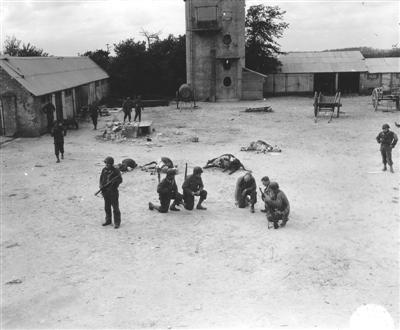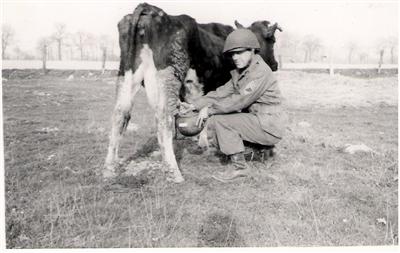Non Ration Foodstuffs: Normandy
Published: Winter, 2010
Author: Charles McFarlane
90th IDPG
Dairy
If there were two notable aspects to the agrarian nature of Normandy, it would be dairy farming and apple orchards. We've already talked about the apples - thus the dairy products.
Photo from the Normandie ArchiveIn Normandy dairy products were abundant. Milk was the most abundantly avialable dairy product, followed by what Army Talks magazine calls “poor cheese”.
Photo from the Normandie Archive
“Barns accompanied most homes. Some were attached, while others sat apart, in the rear. I discovered a milk cow in one. Fresh milk rated as such a rare commodity that I had to give it a try… After a great deal of effort and a few close calls, I scored one cup of milk”
-Page: 171, Bootprints; An Infantrymen’s walk though World War Two, by Hobert Winebrenner Michael McCoy. Camp Camamajo Press-
Milk
Admittedly, this could be a hard one - especially for those food safety squemish types, or the ultra hardcores.
So what do you put the milk in and where do you keep it so it doesnt spoil?
Without making up "back stories" on how you got the milk, it's pretty difficult to do it "right" without having a Cow right there to squirt into a canteen or canteen cup.
Next best option is to have a correct mermite to keep it cool in - or purchase UHT (Ultra High Temperature) pasturized milk, which does not require refrigeration until it is opened. Frequently UHT milk is found in the juice box isle or marketed
From there, its a matter of getting the milk discretely from its non period container into a period container and consuming within a couple of hours of breaking the seal. (if left unrefrigerated).
Cheese
Normandy was not as large of a producer of cheese as other regions of France; it would be more appropriate to use cheese in Eastern France impression.
What cheese was to be found was might have seemed poor to the GI’s who were used to American style hard cheeses and not the soft French cheeses.
GI's were warned by the Medical Department and in Army publications such as Stars and Stripes, and Army Talks to avoid the local cheeses due to potential gastro intestinal distress.
What should I look for in a cheese?
Normandy was not a large center for cheese making, but it did have some local cheeses, like Camembert, Livarot, and Brie.
Obviously try your local grocery stores - where common cheses like Brie can be easily found. If you have a specialty cheese store, or a larger high end grocery store like Whole Foods, ask your cheese monger for reccomendations or tips on finding something that will fit your needs.
As with all things dairy, you need be aware of spoilage and food safety. Cheese may not be the best option at a summer event if you dont have a mermite or other means of keeping it cool.
“From our campsite, I could see a small shop; its sign said it sold dairy products. I thought I would see if they had anything to sell… The woman in the store sold me a full wheel of Brie in exchange for some invasion money. I didn't like the cheese at the time, so I gave it to my buddy John Skuse who did. A full wheel was too much even for him.”
By Frank Wayne Martin, Private First Class, Forward Observer for General Patton
Eggs
Ok, so by this point you're probably wondering if I'm going to give you specific breeds of chickens to get eggs from...
No. Not happening.
Eggs were seemingly always a welcome treat for GI's that have been immortalized in testimony, books and movies. Eggs have their obvious disadvantages, but have advantages over root vegetables. The root vegetables can be somewhat difficult to prepare and cook - requiring a significant amout of time, effort, fuel and are pretty bland at the end. Eggs, if you dont break them - are pretty quick to cook, require relatively little heat for a limited amount of time and arent quite as bland as a boiled potato.What Kind of Eggs should I use and how should I pack them?
Brown eggs are what you want, but make sure there are no stamps on the eggs from the maker. According to our french friend Pat "French eggs are never and have never been white !! (nobody knows why but that how it is). They are always brown. "
Eggs are like beer. If its been refrigerated, it needs to stay refrigerated. Farm fresh eggs that have never been refrigerated will keep without refrigeration. Eggs from the grocery store really should be kept refrigerated when you take it to an event - so keep it in a mermite or a cooler in the car. Farm fresh eggs can go in an ammo can or grenade tube to keep them from getting broken.
Well now that I have the eggs what do I do with them?
You can do a variety of things, scramble them, fry them, boil them, hell you could even make a spam omelet. Just remember, eggs will stick to aluminum like a SOB - so if you have an aluminum cup or messtin - find somebody with a stainless or tinned steel one to cook your eggs in.
If you want to avoid the hassle of transporting and dealing with uncooked eggs at an event - hard boiling the eggs prior to the event is a great option.
On to Page 4 - Meat
90th
IDPG Research






